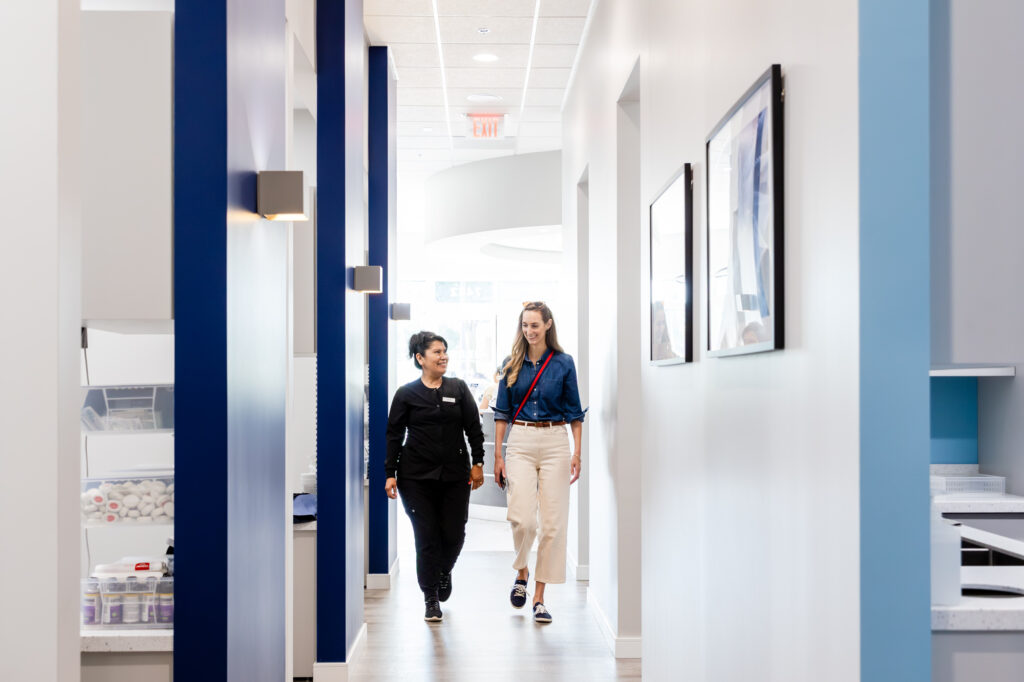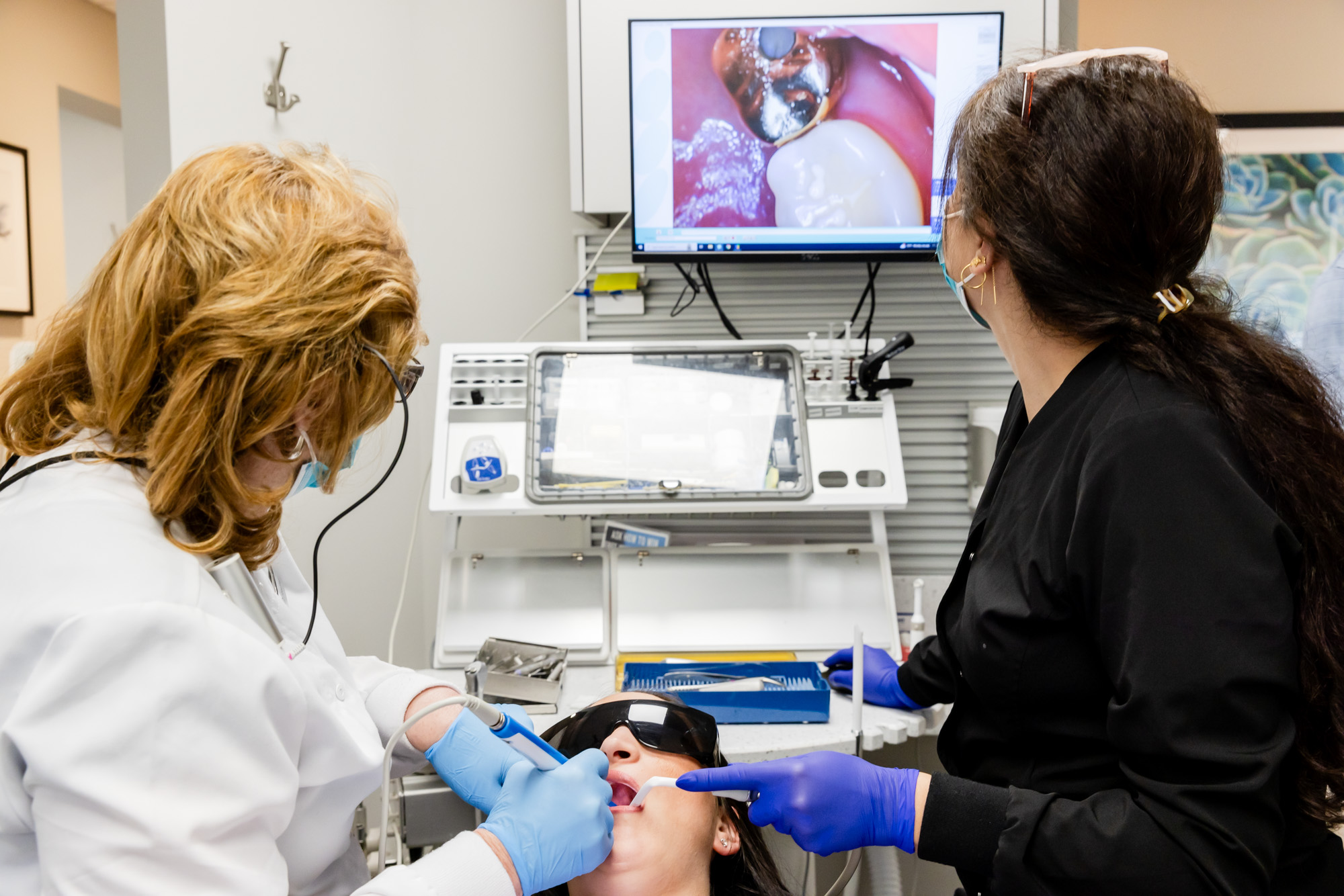During office hours our response is immediate you can expect a call back within a hour of your call.
Emergency Dentistry Overview
Our goal is to always avoid dental emergencies to begin with by providing comprehensive preventative care with our routine check-ups and cleanings. However, they are not always avoidable, so if an emergency arises, such as a broken tooth, unexplained pain, or even a loose crown, we are here to bring you prompt relief.
What Counts As An Emergency?
Many patients come to us after experiencing pain and infection for days, thinking they’re overreacting. But, when it comes to dental emergencies, the sooner you can come into our Herndon dental office to receive care, the better your long-term prognosis will be. Neglecting dental issues can cause serious complications such as tooth loss, bone loss or systemic infections. If you’re experiencing any of the following scenarios, please call in for an emergency appointment right away:
Knocked out or broken tooth
Loose, damaged or lost crown/bridge
Severe toothache
Swelling & bleeding
Abscess or infection
Chipped or cracked teeth
Our Emergency Services
Attending to Knocked Out Teeth: For a knocked-out tooth, your emergency dentist in Herndon will first try to reinsert it into the socket. If the tooth is clean and you come in ASAP, it can often be placed back into its socket. The dentist will use a splint to stabilize the tooth by attaching it to adjacent teeth for a few weeks.
Securing Loose Crowns and Bridges: If a crown or bridge becomes loose or falls out, the dentist will first clean the area and then check the fit of the crown or bridge. It can be re-cemented or bonded back into place if it’s still structurally sound. If the crown or bridge is damaged, it might need to be replaced.
Treating Infections & Abscess: For infections or abscesses, your dentist will first prescribe antibiotics to control the infection. If an abscess is present, they may need to drain it and perform a procedure like a root canal if the infection has reached the pulp of the tooth. In some cases, extraction of the affected tooth may be necessary.
Root Canal Therapy: During root canal therapy, the dentist removes the infected or damaged pulp from the tooth, cleans and disinfects the inner aspects of the tooth, and then fills and seals the space. The placement of a crown often follows this procedure to protect the tooth and restore its function.
Extractions: When extracting a tooth, the dentist will first numb the area with a local anesthetic. The tooth is then gently rocked back and forth to loosen it before removing it from the socket. For more complicated extractions, surgical procedures might be necessary.
Repairing Chipped or Cracked Teeth: To repair a chipped or cracked tooth, a dentist may use bonding, where a tooth-colored composite material is applied to the tooth and shaped to cover the damage. A crown might be necessary to cap the tooth for more significant damage. If the crack extends into the pulp, a root canal might be required before the tooth is covered with a crown.

What to Expect
Our goal when you come in to us with an emergency is to stabilise your condition and bring your relief as quickly as possible. Our friendly team will get you comfortable and then your dentist will assess your situation. This may involve asking about your symptoms, the severity of your pain, and how the injury or issue occurred.
If necessary, the dentist may take X-rays or other imaging to determine the extent of damage. This step is crucial for proper diagnosis and to plan the best course of action.
If you’re in pain, the dentist will take steps to manage it. This might include administering local anesthesia, especially if there’s a need for a more invasive procedure like an extraction or root canal. The dentist will then provide the necessary treatment. This could range from re-cementing a crown, performing a root canal, draining an abscess, fixing a broken tooth, or extracting a severely damaged tooth.
After the emergency treatment, your dentist will give you instructions on how to care for the treated area, what symptoms to watch for, and possibly prescribe medication if needed.
The dentist will schedule follow-up appointments if the issue requires additional treatment, such as a permanent restoration or further dental work.

Emergency Dentists at GoSmiles Dentistry
Fast Help
We promise to get back to you quickly, assessing your situation and providing the best way to move forward.
Trusted Care
Because we’re already familiar with you and your family, we have your history and information at our fingertips for the swiftest help possible. As always, our trusted dentist will advise you on the best treatment for the given situation.
Professional Insight
Our veteran dentists have a significant depth of knowledge of all aspects of dentistry to address and treat any emergency you might have.
Frequently Asked Questions
No, it’s the same quality care. You may receive care from another GoSmiles Dentistry professional should your regular doctor be unavailable, but our commitment to excellent care will always be there.
Call us for recommended steps if you can wait to get back home. If not, we can recommend other steps to find emergency dental care where you are.
This is a critical dental emergency. If a tooth is knocked out, it’s important to handle the tooth by the crown (top part), not the root. If possible, reinsert the tooth into the socket and hold it in place. If reinsertion isn’t possible, keep the tooth moist in milk or saliva. Immediate dental care is crucial for the best chance of saving the tooth.
If a crown or bridge becomes loose, seeing your GoSmiles dentist as soon as possible is important to prevent further damage. In the interim, try to keep the crown or bridge in place. Avoid chewing on that side of your mouth and use over-the-counter dental cement or toothpaste to temporarily reattach the crown if it falls out.
Dental infections and abscesses are serious conditions that require prompt treatment. Symptoms may include severe toothache, sensitivity, swelling, and fever. Treatment typically involves antibiotics to clear the infection and possibly a procedure to drain the abscess. Neglecting treatment can lead to more serious health complications.
When attending an emergency dental appointment, it’s important to bring certain items to ensure prompt care. These include:
- Any dental insurance information or cards.
- A list of current medications and allergies.
- Identification, such as a driver’s license or other ID.
- Relevant medical history, including any previous dental records if available.
- If a tooth or a part of a tooth has been knocked out or broken, bring the fragment with you, kept moist (e.g., in milk or saliva).
Having these items on hand can help our dental team provide the most effective and efficient care during your emergency visit.

Quality Emergency Care
Our compassionate, caring dentists at GoSmiles are here for you.






